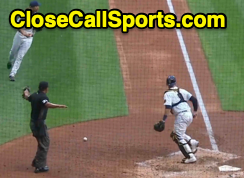The Play: With none out and the bases loaded, White Sox batter Leury Garcia hit a soft ground ball in front of home plate, Brewers pitcher Corbin Burnes throwing to catcher Manny Pina as Chicago baserunner R3 Moncada arrived at home plate.
The Call: With the throw out of Pina's reach and striking Moncada (and Rehak), the run was permitted to score. After a subsequent mound visit and before throwing a pitch to ensuing batter Zack Collins, pitcher Burnes stepped off the rubber and threw home to Pina to appeal that Moncada missed home plate, ruled safe by Rehak, who ruled that Moncada legally touched home plate.
Replay Review: Immediately after Rehak's safe call on the appeal play, Counsell challenged the appeal ruling, resulting in an overturned call when the Replay Official deemed that Moncada had indeed failed to touch home plate.
Controversy: Chicago contended that Iassogna should have disallowed Counsell's challenge because more than 20 seconds elapsed from the initial play at home plate until Counsell's request. However, the umpires allowed the review because Counsell's challenge pertained to Rehak's call on the appeal play, not the initial play, and Counsell did timely file his challenge several seconds (almost immediately) after Rehak's safe-on-appeal call.
Confusion over the Replay Review procedure (which prescribes a 20-second time limit to challenge after an umpire's call) and the appeal play procedure (which can be effected at any time prior to the next pitch, play, or attempted play, regardless of how many seconds or minutes transpire in between [including possible mound visits or other delays]) is apparently so commonplace, MLB saw fit on its website to state, "Appeal plays are not the same as a manager asking the umpire for an instant-replay review."
As to the argument that a request for video review should trump an appeal play (and so should its time limits), refer to Major League Baseball's own Replay Review Regulations: whether a runner touched a base is reviewable, but requires a defensive appeal prior to the Replay Review. In other words, Milwaukee could not have actually requested a review until Rehak ruled on the appeal play.
The Answer: Thus, this is what happened. The initial play transpires with Moncada scoring. The Brewers do not challenge the ruling that the runner has scored. A mound visit then occurs, after which, and before the next pitch is thrown, Milwaukee appeals that Moncada failed to touch home plate, which Rekah replies to by declaring Moncada did touch the plate. In response, and within the 20-second time limit of Rehak's safe-on-appeal call, Counsell challenges the play. Replay overturns the call based on clear and convincing evidence that Moncada failed to touch home plate.
Mechanics: Rehak signaled "safe" after Moncada ran past home plate during the initial play. Ordinarily, an umpire makes no call if either the runner has not touched home plate or if the defense never possessed the ball and never actually attempted to tag the runner. This suggests the initial "safe" call communicated something other than the runner's touch of home plate.
Because Burnes' throw hit Moncada, "safe" could also signal there was no interference on the play, or the general "that's nothing" wave off, similar to a "safe" signal given when a batter-runner and catcher incidentally entangle at home plate or an uncaught third strike eludes the catcher: the runner is "safe" simply because the runner is not (yet) out.
Unfortunately, umpiring mechanics are somewhat limited here in that "safe" carries multiple potential meanings.
Sidebar: The broadcasters mentioned that Chicago should protest the game, and it would be upheld. This is incorrect. OBR 7.04 states, "Protesting a game shall never be permitted, regardless of whether such complaint is based on judgment decisions by the umpire or an allegation that an umpire misapplied these rules or otherwise rendered a decision in violation of these rules."
What the umpires got wrong: When Burnes stepped off the rubber to throw the ball in, Rehak—likely believing that Milwaukee wanted to change baseballs—called "Time" thus declaring the ball dead. By doing so, however, that made any action that followed regarding the appeal attempt void, as if it never happened. The proper call here (other than in keeping play alive, assuming the ball had been put into play after the mound visit) would have been to inform Milwaukee the ball was dead so that the Brewers could return the ball to the mound, allow the umpire to call "Play" to make the ball live, and appeal again.
Realistically: Even though dead ball appeals are not allowed in professional baseball (as opposed to high school, for instance, where they are allowed), the realistic result of this play was an out at home plate on appeal. The umpires could have made Milwaukee execute the appeal again, during live ball action, but the result would have likely been the exact same. It might be time to give the crew chief a microphone.
Related Post: Tmac's Teachable Moments - Let's Fix Replay (1/19/17).
Video as follows:
Alternate Link: Moncada misses home plate and is replayed out, delay ensues (CWS/CCS)
Video as follows:
Alternate Link: Moncada misses home plate and is replayed out, delay ensues (CWS/CCS)
















0 comments :
Post a Comment